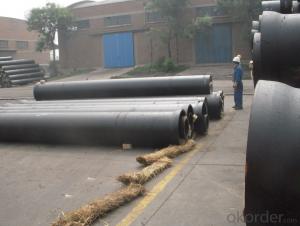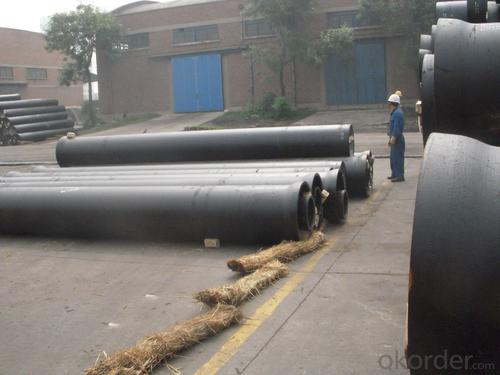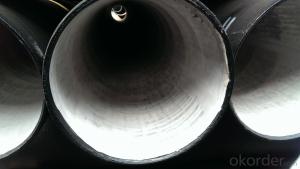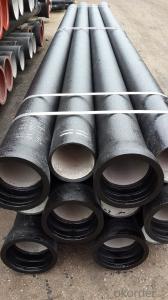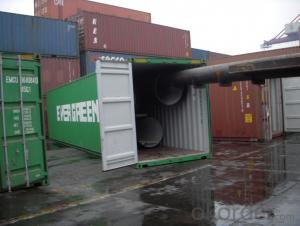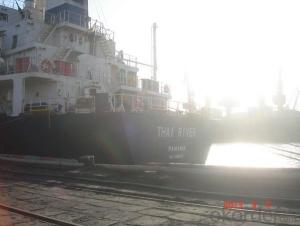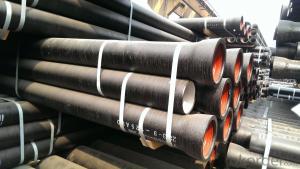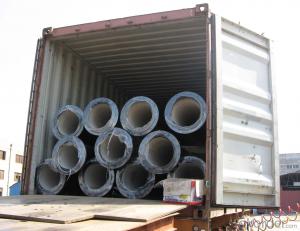DUCTILE IRON PIPES AND PIPE FITTINGS c30 CLASS DN450
- Loading Port:
- Tianjin
- Payment Terms:
- TT OR LC
- Min Order Qty:
- 25 m.t
- Supply Capability:
- 30000 m.t/month
OKorder Service Pledge
OKorder Financial Service
You Might Also Like
Material : Ductile Cast Iron
Size Range : DN 80mm to DN 2000mm
Unit Effective Length : 6m or 5.7m
Manufacture Standard: ISO 2531:1998/ EN 545:2006/EN 598:2007
Annual capacity : 200,000 tons
Coating Exterior: Zinc 130g/m2 according to ISO 8179-1 and bitumen coating 70 microns.
Cement Interior: Portland Cement/ High Alumina Cement/ Sulphate Resisting Cement Lining according to ISO 4179
Special requirements on external coating and internal lining can be applied
We also provide accessories such as SBR/EPDM rubber gaskets, lubricant paste, pipe caps, PE sleeves, etc.
Additional Parts:
Each pipe is strictly inspected according to related standard to ensure permanently high performance.
Easy Installation at site and service free for life
Long Service Lifespan
Quotation will arrive you within 24hours once we get your inquiry.
We guarantee offering you a competitive price.
A copy of original inspection reports of pipes will be offered after shipment.
Photos of loading process will be sent to the customer after shipment effect.
We will follow-up the delivery progress after shipment effect and update to the customer on weekly basis.
- Q: Are ductile iron pipes suitable for use in irrigation gate systems?
- Yes, ductile iron pipes are suitable for use in irrigation gate systems. Ductile iron is known for its durability, strength, and corrosion resistance, making it an ideal choice for applications requiring reliable and long-lasting piping systems like irrigation gate systems. Additionally, ductile iron pipes have excellent flow characteristics, allowing for efficient water distribution in irrigation systems.
- Q: Are ductile iron pipes suitable for installation in areas with high soil compaction and traffic loads?
- Ductile iron pipes are well-suited for installation in areas characterized by high soil compaction and heavy traffic. These pipes possess a remarkable tensile strength and exceptional resistance to external loads, rendering them perfect for regions with compacted soil and significant vehicular movement. Their design enables them to endure the pressure and strain induced by the substantial weight of the soil and the constant motion of large vehicles. Furthermore, they exhibit excellent flexibility, enabling them to absorb and disperse the load more effectively, thereby minimizing the likelihood of damage or failure. Hence, ductile iron pipes are a dependable choice for installation in areas with a combination of high soil compaction and heavy traffic loads.
- Q: Can ductile iron pipes be used for trenchless installation methods?
- Yes, ductile iron pipes can be used for trenchless installation methods. Trenchless installation methods, such as horizontal directional drilling or pipe bursting, allow for the installation of pipes without the need for extensive excavation. Ductile iron pipes are known for their strength, durability, and flexibility, making them suitable for these trenchless methods. Additionally, ductile iron pipes have excellent resistance to corrosion and can withstand high-pressure conditions, further enhancing their suitability for trenchless installation.
- Q: Do ductile iron pipes require additional protection against external factors?
- Yes, ductile iron pipes typically require additional protection against external factors such as corrosion and abrasion. This can be achieved through the application of protective coatings or linings, cathodic protection systems, and proper installation practices. These measures help extend the lifespan and ensure the durability of ductile iron pipes in various environments.
- Q: How do ductile iron pipes handle thermal cycling in industrial applications?
- Ductile iron pipes are known for their exceptional ability to handle thermal cycling in industrial applications. Thermal cycling refers to the fluctuation in temperature that occurs during the operation of various industrial processes. These pipes are designed to withstand the stresses caused by thermal expansion and contraction, making them highly suitable for environments with significant temperature variations. One of the key characteristics of ductile iron pipes is their high thermal conductivity. This means that they can efficiently conduct heat away from the hot areas, minimizing the impact of thermal cycling. Additionally, ductile iron pipes have a low coefficient of thermal expansion, which means that they expand and contract at a slower rate compared to other materials. This helps to reduce the stresses imposed on the pipes during thermal cycling. Furthermore, ductile iron pipes have excellent mechanical properties, including high tensile strength and impact resistance. These properties enable the pipes to withstand the mechanical stresses that may arise due to thermal cycling. They can resist the formation of cracks or fractures, ensuring the integrity and longevity of the pipes in industrial applications. Moreover, ductile iron pipes have a high resistance to corrosion and oxidation. This is particularly important in industrial settings where the pipes may be exposed to aggressive chemicals or harsh environments. The corrosion resistance of ductile iron pipes ensures that they can withstand the corrosive effects of the process fluids and gases, even during thermal cycling. In summary, ductile iron pipes are well-equipped to handle thermal cycling in industrial applications. Their high thermal conductivity, low coefficient of thermal expansion, excellent mechanical properties, and resistance to corrosion make them a reliable choice for environments with significant temperature variations. These pipes can effectively withstand the stresses caused by thermal cycling, ensuring their durability and longevity in industrial settings.
- Q: Are ductile iron pipes suitable for use in industrial applications?
- Yes, ductile iron pipes are suitable for use in industrial applications. Ductile iron pipes are known for their high strength and durability, making them ideal for handling the demands of industrial environments. They are resistant to corrosion and can withstand high pressures and temperatures. Additionally, ductile iron pipes have excellent impact resistance, making them suitable for use in areas with heavy traffic or potential for mechanical damage. Their flexibility allows them to absorb vibrations and shocks, further enhancing their suitability for industrial applications. Overall, ductile iron pipes are a reliable and cost-effective choice for various industrial sectors such as water and wastewater treatment, mining, power generation, and chemical plants.
- Q: Can ductile iron pipes be used for underground compressed air systems?
- Yes, ductile iron pipes can be used for underground compressed air systems. Ductile iron is known for its strength and durability, making it suitable for handling high-pressure air. Additionally, ductile iron pipes have good resistance to corrosion and can withstand the underground environment, making them a reliable choice for compressed air systems.
- Q: Can the underground cast iron pipes be connected with clamps to form buttress?
- The clamp hoop is a connecting device for connecting pipe fittings, valves and pipe fittings with grooves. Used in the fast joint between the role of tightening, the general two joints with gaskets, rubber, and silicone, ptfe.
- Q: What is the expected sound attenuation of ductile iron pipes?
- The expected sound attenuation of ductile iron pipes can vary depending on several factors. Generally, ductile iron pipes have good sound attenuation properties due to their dense and thick-walled construction. The material's density helps to absorb and dampen sound waves, reducing the transmission of noise. Additionally, the thickness of the pipe walls also contributes to sound attenuation by providing an extra barrier for sound to pass through. However, it is important to note that the specific sound attenuation of ductile iron pipes can be influenced by other factors such as pipe diameter, wall thickness, installation method, and surrounding environment. For example, larger diameter pipes may have slightly lower sound attenuation compared to smaller diameter pipes due to increased surface area. Similarly, variations in wall thickness can affect the sound insulation properties. In terms of installation, the presence of joints or fittings in the pipeline can potentially create sound transmission points, reducing sound attenuation. Therefore, proper installation techniques that minimize the use of joints and fittings can help enhance sound attenuation. Furthermore, the surrounding environment can also impact sound attenuation. For instance, if the pipes are buried in soil, the soil's composition and density can affect the sound transmission properties. Additionally, the presence of other structures or materials in the vicinity may influence the overall sound attenuation performance. To determine the specific expected sound attenuation of ductile iron pipes for a particular application, it is recommended to consult manufacturer specifications or seek assistance from acoustic engineering professionals who can take into account all relevant factors and conduct specific tests or simulations to provide accurate predictions.
- Q: How does ductile iron pipe handle changes in pipe diameter or size?
- Ductile iron pipe is designed to handle changes in pipe diameter or size with relative ease. It possesses excellent flexibility and can accommodate variations in pipe dimensions without compromising its structural integrity. This is mainly due to its unique composition, which includes a significant amount of graphite nodules that provide ductility and elasticity to the material. When faced with changes in pipe diameter or size, ductile iron pipe can be easily manufactured or modified to meet specific requirements. It can be cast or fabricated in various diameters and lengths, allowing for seamless integration and adaptability within a pipeline system. This versatility is particularly beneficial in scenarios where different pipe sizes need to be connected or when the pipeline layout requires alterations. Moreover, ductile iron pipe's superior mechanical properties make it capable of withstanding the stresses and forces associated with changes in pipe diameter or size. It exhibits high tensile strength, impact resistance, and durability, ensuring that it can handle the internal and external pressures exerted on the pipe during operations. Additionally, the jointing systems used with ductile iron pipe contribute to its ability to handle changes in diameter or size. Various joint types, such as push-on, restrained, or mechanical joints, provide secure and leak-free connections between different pipe sections. These joints allow for easy assembly and disassembly, enabling efficient adjustments to the pipe diameter or size as needed. In conclusion, ductile iron pipe is well-equipped to handle changes in pipe diameter or size due to its inherent flexibility, adaptability, and robustness. Its composition, manufacturing capabilities, and jointing systems all contribute to its ability to accommodate variations in pipe dimensions without compromising its performance.
Send your message to us
DUCTILE IRON PIPES AND PIPE FITTINGS c30 CLASS DN450
- Loading Port:
- Tianjin
- Payment Terms:
- TT OR LC
- Min Order Qty:
- 25 m.t
- Supply Capability:
- 30000 m.t/month
OKorder Service Pledge
OKorder Financial Service
Similar products
Hot products
Hot Searches
Related keywords
